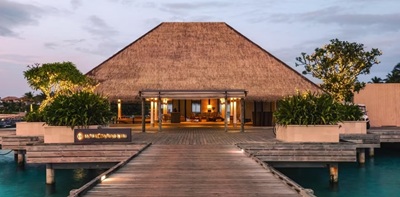 MALDIVES—Green Lodging News was recently approached to learn more about the environmental efforts at the InterContinental Maldives Maamunagau Resort. The following are the results of questions presented by Green Lodging News to Shoaib Siddiqui, Assistant Chief Engineer at the resort.
MALDIVES—Green Lodging News was recently approached to learn more about the environmental efforts at the InterContinental Maldives Maamunagau Resort. The following are the results of questions presented by Green Lodging News to Shoaib Siddiqui, Assistant Chief Engineer at the resort.
1. In what year did the property open?
2019
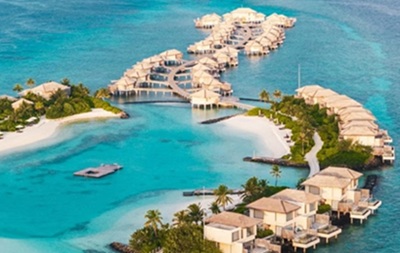 2. How many employees?
2. How many employees?
290
3. What plastics have been eliminated to qualify the resort as being free of single-use plastic? For example, is water now available in glass bottles? Another form? Are bathroom amenities available in pump dispensers? What other single-use plastics have been eliminated and why is it so important to do that?
From the very beginning, the resort has been committed to being free from single-use plastics. We have never used plastic bottles for drinking water; instead, water is produced and bottled right here on the island in reusable glass bottles.
All guest bathroom amenities are presented in refillable pump dispensers, which not only provide a more luxurious experience but also significantly reduce plastic waste.
In addition, plastic straws, cling film, takeaway containers, and amenity wrappers have been completely eliminated and replaced with sustainable alternatives made from paper, bamboo, or other biodegradable materials.
Reducing single-use plastics is vital to protecting the fragile marine ecosystem surrounding our island. Every step we take helps ensure that the natural beauty of the Maldives remains unspoiled for generations to come.
4. What is sustainable about the resort’s spa services, products used by spa staff?
Sustainability is at the heart of our spa experience. Many of our treatments use natural and locally sourced ingredients such as sand, grated coconut, and Virgin Coconut Oil produced in the Maldives, allowing guests to enjoy an authentic island-inspired wellness experience with minimal environmental impact.
We also reuse discarded linens to create poultices, reducing waste while adding a unique, personal touch to our therapies.
The products we use and retail, including The Organic Pharmacy and Biologique Recherche, are chosen not only for their results but also for their commitment to sustainable and eco-friendly packaging.
Every detail—from the ingredients to the packaging—reflects our dedication to wellness that is as kind to the planet as it is to our guests.
5. Explain how sustainability guides the resort’s food procurement processes. Does it grow any of its own food items? The island is quite isolated. Does that increase the carbon footprint of food procurement?
At InterContinental Maldives Maamunagau Resort, sustainability is central to the food and beverage philosophy, guiding efforts to reduce environmental impact, support local communities, and provide guests with responsibly sourced, fresh ingredients. The resort partners with ethical suppliers, sourcing seafood from certified sustainable fisheries and local catch to cut transport emissions, while fruits, vegetables, and herbs are obtained from nearby islands to support Maldivian farmers. Small-scale herb and microgreen gardens on the island supply fresh aromatics like basil, mint, and lemongrass, reducing waste and ensuring freshness. To offset the carbon footprint of operating in a remote location, the resort consolidates shipments, uses eco-friendly packaging, and focuses on seasonal, regional produce. Waste is minimized through portion control, composting, and recycling programs. Despite logistical challenges, InterContinental Maldives weaves sustainability into every aspect of food procurement, balancing exceptional dining with environmental and community responsibility.
6. Tell me a bit about the reefs that are managed, if any, by resort personnel. Can guests visit the reefs? Can they support them in any way?
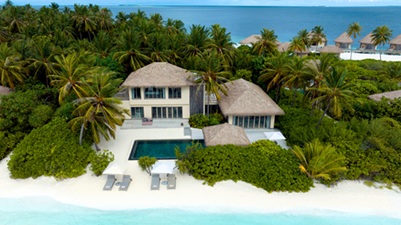 The resort has an exceptional house reef, surrounded by a myriad of marine life and housing a manta ray sanctuary. In collaboration with Ocean Group, the resort leads coral replantation and rehabilitation projects to protect and restore coral cover and increase ecosystem resilience. Guests play a crucial role in our coral restoration efforts—by experiencing our healthy reefs they become conservation ambassadors, but they can also adopt a coral line, learn about the reefs with our onsite marine biologists, and contribute to our research program.
The resort has an exceptional house reef, surrounded by a myriad of marine life and housing a manta ray sanctuary. In collaboration with Ocean Group, the resort leads coral replantation and rehabilitation projects to protect and restore coral cover and increase ecosystem resilience. Guests play a crucial role in our coral restoration efforts—by experiencing our healthy reefs they become conservation ambassadors, but they can also adopt a coral line, learn about the reefs with our onsite marine biologists, and contribute to our research program.
7. There is a manta ray sanctuary on-site. Please explain. Can guests interact with them?
Yes, InterContinental Maldives has the unique privilege of occupying an island in close proximity to a newly discovered juvenile manta feeding ground in Raa Atoll and began working with the Manta Trust in 2019 to research and protect these incredible animals. After they have been properly briefed to ensure their encounter is enjoyable and sustainable, guests have the opportunity to swim with the mantas in Maamunagau lagoon. They can also get involved in our “Name and Adopt a Manta” initiative ($165 for a digital adoption pack, one year Cyclone membership and chance to choose a name), to support the work of the Manta Trust and their global efforts to protect them.
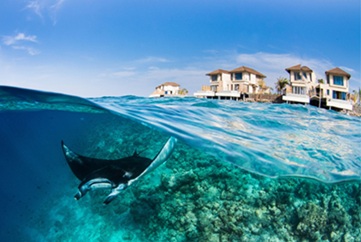
8. Explain the numerous ways the resort works to reduce its carbon footprint. Address lighting, air cooling (if needed). Where on property is the solar installation? When was it installed and how is it performing?
To conserve the fragile environment, the resort has installed 1,577 heavy-duty solar panels covering 2,594 sqm. This system produces 952,620 kWh, which is 15 percent of the resort’s total energy requirement resulting in a vast reduction of 900 tons of CO2, annually.
9. In what ways is water conserved? Please explain how the InterContinental Maldives’ Ultrafiltration and Reticulation Plant System works. What water is treated by the system?
It helps carry a production capacity of 155,000 liters of water per day, distributing the treated water in fields such as the irrigation lines, bathrooms, cooling towers, and the air-conditioned chilled water lines.
10. In such a remote place, where to put “waste” must be a real challenge. What initiatives have been most effective?
The resort has implemented a glass crushing system that helps minimize glass particles to be used as a component alongside aggregate in concrete work. Wastage of food is thoroughly monitored and registered, with strict procedures in place for food shipment and preparation. InterContinental Maldives is committed to reducing plastic use by 90 percent and glass waste by 80 percent, with new technology and investments helping to optimize resources year by year.
11. In what ways are guests involved in coral plantation and restoration? Why is that restoration needed? Has the coral been dying out?
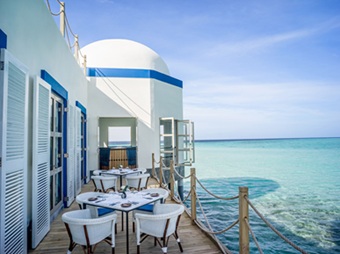 Guests are invited to participate in the resort’s coral reef restoration program. Using rope nurseries, small coral fragments grow into resilient corals within two years, which are then transplanted onto dead reefs, restoring vibrancy and life to the reef. Guests can participate by sponsoring a coral line, making a direct contribution to securing the surrounding reef for generations to come.
Guests are invited to participate in the resort’s coral reef restoration program. Using rope nurseries, small coral fragments grow into resilient corals within two years, which are then transplanted onto dead reefs, restoring vibrancy and life to the reef. Guests can participate by sponsoring a coral line, making a direct contribution to securing the surrounding reef for generations to come.
12. In what ways do guests and staff participate in the protection of sea turtles?
Maamunagau Island is a haven for sea turtles. The resort protects their nests and ensures the incredible journey of hatchlings to the ocean. These turtles, born on the same island, return years later to complete the circle of life.
13. In what ways does the presence of the resort benefit the local community?
From supporting schools and offering career pathways for local students, to sourcing seafood directly from fishing boats and chapatti from local bakers, InterContinental Maldives is committed to adding value to the local economy and culture.





